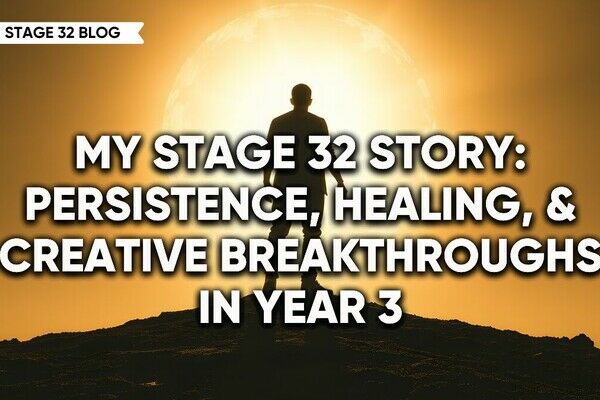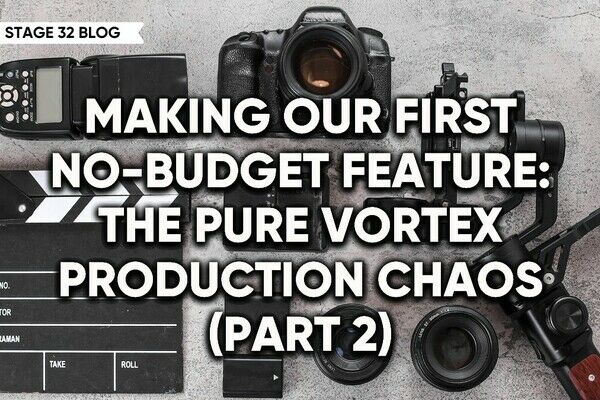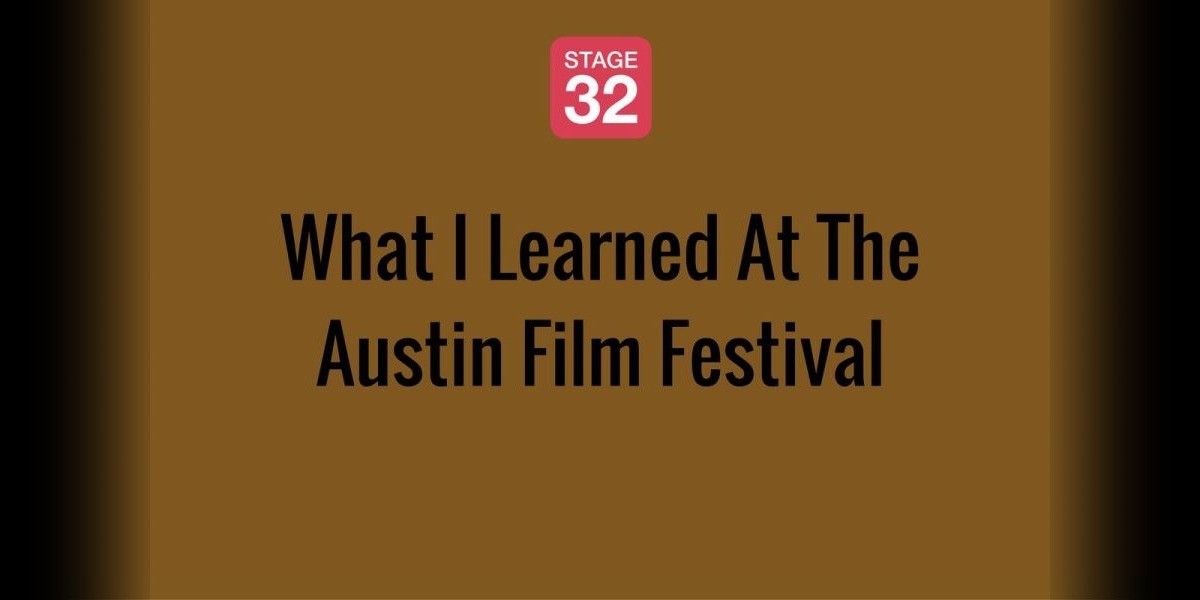What I Learned At The Austin Film Festival
I’m not new to the planet, but I am new to the professional writing world, so when my 1st screenplay made the 2nd Rounder list at the 2016 Austin Film Festival, I wasn’t sure whether or not I should go. After all, I have another life—a day job, 3 kids, a Maytag full of their dirty laundry and a standing date for missionary sex with my spouse every other Thursday. How could I ditch all that glam to go to Texas? I polled my friends, my husband and my dogs: they all said go. My wallet disagreed, knowing I have $5 in disposable income until the holidays. But I never listen to my wallet, so I asked my imaginary best friend, Stage 32 contributor Lee Jessup (whom I’ve actually never met, but I’m a big fan of her e-book Getting It Write) and she said go, so I did.
Was it worth it?
Hell, yes. Where else can you meet a wide array of award-winning film and TV industry execs and professionals with years of real-life experience, who not only make a living in your career of choice but actually tell the truth?! If you consider that the average lawyer charges about $400 per hour, depending on where you live (Vancouver, BC, in my case) you can attend the festival, get a decent hotel room, airfare, transfers and all the Tex-Mex you can eat for about 3 hours in legal fees. That’s a screaming deal for the caliber of advice you’ll get and the people you’ll meet. Still not convinced? How about this: most writers will toil away alone in their basement, dripping their brain onto paper for hours, months—and in some cases, years—before someone qualified will actually read their work and give them directional advice on how to best reach their goal. At the Austin Film Festival (or AFF), you get that and more in just a few days and it can impact the rest of your life. Add to that the fact that most people are attending for the first or second time and have come alone, so you’ll find them open, friendly, and interested in the same things you are.
You have about 350 days until next year’s conference, so here are ten things I learned at the 2016 Austin Film Festival that might help you in the interim, plus a few of my own life lessons to help keep you on track:
- FEATURE FILMS AREN’T DEAD, BUT TV IS THRIVING: Sure, the digital world has increased the opportunities for feature-film writers as well as TV writers, but there are literally 10 times the opportunities for writing in TV. You’ll likely have a better shot at a writing career if you want to write a half-hour sit-com or hour long drama than if you want to write a ninety minute or two-hour feature film.
- L.A. IS WHERE IT'S AT: Many AFF panelists spoke to the importance of being local. Even if you’re a brilliant writer, if you’re a pain in the ass to connect with, they’ll choose to work with someone who lives in L.A. over you. Some TV execs won’t even read the work of writers who don’t live in the area, so research your field and consider the move if your success depends on it. If you can’t move, consider how to make yourself more accessible from where you are.
- SCREENPLAY CONTESTS MATTER: TV & film professionals are busy people; they simply don’t have time to read everything they’re sent, or there are legal implications to reading unsolicited work, so most of it ends up in the ‘slush’ pile. Screenplay contests are an easy way to get your work out of the slush pile and into the hands of someone who can actually help your career. Not every contest is created equally, so do the research to find out which contest best suits you and enter early for the cheapest fee.
- PERSONALITY COUNTS: All the panelists and moderators I saw were smart, savvy and likeable people. Why? One agent said it best, “Assholes aren’t invited to conferences.” The AFF panelists know what they’re talking about, are open and engaging, and genuinely want to help. Personality also matters in a writing career. Agents, managers and execs consistently talked about wanting to only work with people who were conscientious, considerate, and professional, whether those writers were creating features or writing for TV. Personality is even more important in a writing room, which one panelist described as, “a 10 hour bus ride.” Other writers don’t want to work with people who are divas or can’t get along with others. Bottom line? Don’t be a dick.
- RESEARCH IS CRUCIAL: There has never been an easier time to find out what you don’t know; all you have to do is Google it. But thinking that you don’t need to know what you don’t know—like the name of the agent you’re pitching to—is the definition of ignorance. All the AFF panelists spoke to the importance of research: know your genre, what gets made and what doesn’t. Know what kind of work you want to do and who’s actually doing it. Find out which execs are looking for the work you’re creating, how to pitch to them, what managers and agents want in a client and how to spell their names. Hollywood loves to talk about and congratulate itself, so all this information is online.
- FEEDBACK, FEEDBACK, FEEDBACK: You can’t fix a problem you don’t know exists, but often it’s hard to find someone competent to read your work and give you effective feedback that you can implement into your next draft. The AFF is a great way to meet other writers or find a writing partner. Those who attend are typically in the early or mid-stages of their careers and more than willing to offer insight, support and encouragement. You can commiserate with like-minded people, learn which contests are better than others, or align with other writers to read each others’ work.
- AIM HIGH: Don’t stop working on your feature or TV screenplay until it’s as good as you can get it, and don’t send it out until it is. Not only is high quality writing easier to read and sell, but one AFF panelist said a feature-film deal might take between three and nine years (!) from start to finish, so he had to be in love with the work he was taking on if he was going to commit to it for that long. Is your work worth a nine-year commitment from someone who doesn’t know you? I can honestly say mine was not. Don’t be afraid to go back to the drawing board.
- REMEMBER THE 3 P’S: PASSION, PERSISTENCE & PATIENCE: PASSION: Every story might have been told before but the simple truth is it hasn’t been told by you. Nothing sells like authenticity so don’t chase trends or try to figure out what the next big thing will be. Write what you’re passionate about and write the best story only you can tell. No one else can do that. PERSISTENCE: You might be closer to your goal than you think but you won’t know if you give up now. Most AFF panelists spoke to how success came only after a writer’s repeated attempts to break into the business, upgrade their skills, or perfect their story, so keep trying. Rejection is a fact of life but it doesn’t mean this isn’t the field for you. Many execs, agents and managers said they gave in and read the work of someone who contacted them respectively but persistently. Two common rules: comply with manager and agent guidelines and contact the same individual no more than once a month. PATIENCE: Many panelists said "overnight" success came after 10-20 years of hard work, so keep that in mind when you get the next rejection notification or worse, no notification at all. When you’re too disillusioned to continue, take a break, earn an honest paycheck doing something else, and revisit your writing when you can. It may take a while, but you will only get there if you keep going.
- HOLLYWOOD IS NOT FULL OF EVIL PEOPLE TRYING TO STEAL YOUR IDEAS: Yes, evil exists; why else would we have unpaid internships or the man-bun? But industry execs don’t have time to steal your idea; they just want a good script, so do the research, protect your work through copyright and the Writers Guild of America (a hugely important and helpful resource, BTW), then submit your work only to those contests, agents and managers who promise—in writing—to respect your rights. The good ones will make this information upfront and accessible.
- WRITING IS A BUSINESS: At the end of the day, everyone has to pay the rent. It’s much easier to become a working writer and navigate through the business if you keep that in mind. Agents and managers typically get 10% (each) of what you make on a given project, so they’re not going to want you as a client or maintain that relationship if you’re not making them money. Even if your last script was an award-winner, you have to keep creating good work that will sell. Filmmakers and related execs might be appreciate your talent, but if your screenplay won’t sell, they can’t afford to work with you. Do what you can to make your work high quality and easy to sell. If you win, they win.
Hope you enjoyed my (non-professional) take on the 2016 Austin Film Festival. I come from an unrelated but similarly creative industry, so here are a few life lesson I’ve learned along the way, from my creative process to yours:
- CONFRONT YOUR BRUTAL TRUTH: You’ll get a lot farther ahead—in this or any career—if you know where your deficits are and are willing to address them. Unlike many other industries (mine included), you can actually make a living as a self-taught writer. Just know that much of your competition has attended accredited schools specifically geared to the film and TV business, lives in L.A., and/or is well-connected. In order to compete you need to polish your skill set, know where you're weak and how to fix it. Nothing gives you that information like feedback, so do whatever you can to get your work into the hands of knowledgeable people. You can implement the advice you get or decide to go a different route, but make that a conscious decision you can back up if asked why you made that choice in a future meeting.
- GET OUT OF YOUR OWN WAY: Writers, filmmakers, designers and other creatives are all artists at heart, which means you’ll spend 50% of your time convinced you’re a brilliant, undiscovered and unappreciated talent, and 50% of your time plotting to kill yourself because you’re such a pathetic loser. Accept that such duality exists and move on. On your good days, write detailed notes to yourself explaining why you’re gifted or driven or competent. And on your bad days, read them—and again. When you’re ready to put your work out into the cosmos, don’t let doubt cloud your judgment. Arm yourself with as much positive feedback as you need to convince you your work is ready to go, then listen to the voices outside your head, not the self-sabotaging ones that keep you up at night.
- JUST DO THE WORK: Every writer knows 10 other writers (or wanna-be writers) who they believe are more qualified. If they’re not rich and famous, why should you aim for it? Because in this or any other industry, talent alone is rarely enough. Being talented doesn’t mean you have a good work ethic, can get along with other people or will show up on time. Most importantly, you have to do the work and—surprise!—doing the work, again and again and again, actually makes you better at the work itself. You may get in the door because you have connections or a sparkling personality or big hooters, but what will keep you in the room is the quality of your work. Quit whining and just do the work. In the end, good work speaks for itself.
Thanks for reading!
About Aj:
Aj is a screenwriter from Vancouver BC Canada and you can connect with her on Stage 32!
Like this blog post? Please share it on social media (Facebook, Twitter, LinkedIn, email etc) by using social media buttons at the top of the blog. Or post to your personal blog and anywhere else you feel appropriate. Thank you.
As always, we welcome thoughts and remarks on ANY of the content above in the Comments section below...
| Award-Winning Director Michael Polish Coming to Stage 32! |
| 10 More Days of Writing! What's Your Routine? |
Search Stage 32 Blog
There are now 4037 blog posts for you to enjoy. Search them all by tags below.
Acting, Advice, Cinematography, Coffee & Content, Composing, Contests, Distribution, Featured, Filmmaking, Financing, Inspirational, Networking, Producing, Screenwriting, Success Stories, Tips, Trending,Relevant Tags
Recommended Articles

My Stage 32 Story: Persistence, Healing, & Creative Breakthroughs in Year 3

November Write Club Week #3: How To Make A Strong First Impression When Meeting Execs, Producers, & Reps

Making Our First No-Budget Feature: The Pure Vortex Production Chaos (Part 2)

Insider Intel: 2026 Predictions

A Practical Guide for Actors: Tips & Advice Every Performer Should Know

Want Success in the Entertainment Industry? Start Writing Your Own Narrative

Coffee & Content: The Genius of Weapons and How to Know When Your Script Is Ready

Stage 32 Now Certifying Centro de Portugal Film Commission!

Stage 32 Certification Featured In IndieWire!






